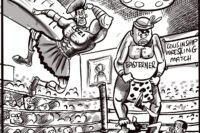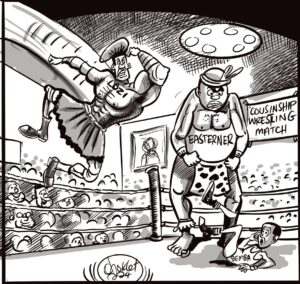THE National Pension Scheme Authority (NAPSA) has applied for leave to serve court process on ADD president Charles Milupi by way of public advertisement in a newspaper, in a case where it has sued him and News Diggers Media Limited.
It has argued before the Lusaka High Court that it attempted to obtain Milupi’s physical address for purposes of effecting personal service but that its efforts proved futile.
In this matter, NAPSA has sued Milupi and News Diggers Media Limited in the Lusaka High Court, seeking damages for libel and malicious falsehood over a publication that allegedly accused it of corruption and mismanagement of members’ funds.
The said publication was published on June 23, last year and was headlined “The NAPSA, AVIC deal stinks of corruption”.
NAPSA is further seeking an injunction restraining Milupi and News Diggers, whether by themselves, their servants or agents or otherwise from further publishing or causing to be published, the said words or any similar words defamatory to it.
It also wants interest on all sums found to be due as damages, legal costs and any other relief the court may deem fit.
But according to an affidavit in support of ex-parte summons for an order of substituted service by way of public advertisement, NAPSA submitted that its efforts to obtain Milupi’s physical address for purposes of effecting personal service had proved futile.
Mukubi Kawana of Messrs Corpus Legal Practitioners, the advocates representing NAPSA, stated that NAPSA only knew Milupi as a resident of Lusaka but did not know his actual physical address.
He claimed that when they attempted to reach Milupi by telephone so as to inquire about his physical location for purposes of effecting personal service on him, he did not provide them with one.
Kawana stated that as a result of its failure to locate Milupi, NAPSA was unable to effect personal service on him.
“That in the premise, it is desirable and in the interest of justice that the plaintiff (NAPSA) be granted leave to serve court process by substituted service by way of public advertisement in a newspaper of general circulation,” read the affidavit.
Kawana added that no party would be prejudiced if the court allowed NAPSA to effect service of court process as indicated.
NAPSA had stated in its statement of claim that its principal objective was to provide social security to the Zambian labour force by collecting monthly contributions from the labour force and investing the contributions in viable projects.
It added that this was in order to grow the fund that would be available for payment of pension benefits to its members when they reached the retirement age.
NAPSA further stated that one of the projects which it resolved to invest in was a project named the ‘Twin Palm River View Park Infrastructure Development’ in the east of Lusaka and that it invited the public to submit bids to undertake the development of the said project.
It stated that among the entities that submitted bids was AVIC International Limited, a company that has proved record in the construction industry in Zambia, and after evaluating all the bids which NAPSA received, it awarded the contract to develop the project to AVIC.
The authority stated that between June 23, 2019 and June 29, 2019, Milupi issued and News Diggers Media Limited published, in relation to NAPSA’s award of the said contract to AVIC, accusations of corruption and mismanagement of members’ funds against NAPSA.
NAPSA stated that in their natural and ordinary meaning, the words contained in the publication meant and were understood to mean that NAPSA corruptly awarded the tender to develop River View Park to AVIC.
It further stated that the words contained in the publication were false, published maliciously, and were calculated to cause and did in fact cause damage to its integrity as well as business.
NAPSA stated that the publication generated various comments from the members of the public who condemned it in disparaging manner and that the said comments significantly lowered it in the esteem of right-thinking members of society and affected the confidence the members of the scheme had towards it.












